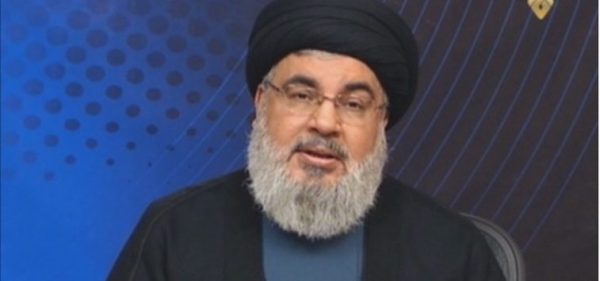 Hassan Nasrallah, leader of the Iranoian backed Hezbollah militant group claimed on Sunday that Saudi Arabia had forced Lebanon’s Prime Minister Saad al-Hariri to resign, and called for calm and patience in Lebanon.
Hassan Nasrallah, leader of the Iranoian backed Hezbollah militant group claimed on Sunday that Saudi Arabia had forced Lebanon’s Prime Minister Saad al-Hariri to resign, and called for calm and patience in Lebanon.
Hariri, a political ally of Saudi Arabia resigned on Saturday in an unexpected declaration from the kingdom, citing a plot to assassinate him and slamming Hezbollah and its Iranian backers for sowing strife in the Arab world.
The resignation of the prime minister, a Sunni Muslim, toppled a coalition government that included Hezbollah.
“The resignation was a Saudi decision dictated to prime minister Saad al-Hariri and forced on him,” Nasrallah said in a televised broadcast, adding that there was no domestic reason for Hariri’s decision.
Nasrallah urged Lebanese not to hold protests in response to the resignation, saying “this will not lead to any result”.
“We urge against political escalation,” he said.
Nasrallah also said “legitimate questions” were being raised in Lebanon over whether Hariri was being detained in Saudi Arabia. Hariri allies in Lebanon have denied suggestions that he had been detained.
Saudi Arabia’s Crown Prince Mohammed bin Salman has tightened his grip on power through an anti-corruption purge by arresting royals, ministers and investors including billionaire Alwaleed bin Talal, one of the kingdom’s most prominent businessmen.
Nasrallah also urged calm in connection with the fears that were sparked by Hariri’s surprising resignation.
“Everyone was surprised by the resignation, even al-Mustaqbal Movement’s leadership, and this resignation has undoubtedly created an atmosphere of tension in Lebanon, especially with the threats and analyses that accompanied it,” Hizbullah’s chief added.
Hezbollah is “keen on Lebanon’s security and civil peace” and “we call for calm,” he said.
Commenting on his meeting with the leaders of the Hezbollah-affiliated resistance brigades on Saturday he claimed that they have been scheduled prior to Hariri’s resignation in order to mark 20 years since the foundation of the Brigades.
“It had nothing to do with any development,” Nasrallah stressed in s possible reference to reports of a possible repeat by Hezbollah of the 2008 violence .
Back in May 2008 Nasrallah said in a speech following the occupation of Beirut ” Whoever is going to target us will be targeted by us. Whoever is going to shoot at us will be shot by us.”
The 2008 conflict in Lebanon[ began on May 7. The fighting was sparked by a government move to shut down Hezbollah‘s telecommunication network and remove Beirut Airport‘s security chief Wafic Shkeir over alleged ties to Hezbollah. Nasrallah said the government’s decision to declare the group’s military telecommunications network illegal was a “declaration of war” on the organization, and demanded that the government revoke it.
Hezbollah and its affiliated resistance brigades seized control of several West Beirut neighborhoods from Future Movement militiamen loyal to the government, in street battles that left 11 dead and 30 wounded. Hezbollah also tried but failed to occupy Mt Lebanon
“We call for avoiding a return to the previous tensions or to any street protests,” Nasrallah urged.
Nasrallah also downplayed the possibility of an external military attack on his group, dismissing rumors that were circulated following Hariri’s resignation.
“Israel does not work in the service of Saudi Arabia and an Israeli aggression would hinge on Israeli calculations… All Israelis have unanimously agreed since the July War that Israel will only go to war with Lebanon if the cost is low and victory is guaranteed,” Nasrallah said.
“The resignation of our government has nothing to do with Israel’s calculations,” he noted.
Hariri cited the “grip” of Hezbollah’s ally Iran on the country .
The resignation sparked fears that Lebanon — split into rivals camps led by Hariri and Hezbollah — could once again descend into violence.
It remains unclear who will succeed Hariri as prime minister in Lebanon.
Hilal Khashan, a professor at the American University of Beirut, who teaches political science told VOA on Saturday that he did not think a new government would be formed anytime soon and that Hariri’s government would continue to govern in a caretaker capacity for a long time.
“We are used to having a caretaker cabinet perform its functions for a year or so,” said Khashan. “So, it will be a long time before another cabinet is formed [and] it will be a long time before another Sunni leader will accept to form a cabinet. … Otherwise, he would be labeled a traitor.”
Announcing his shock resignation earlier in the day, Hariri said he was stepping down in protest at Iran’s interference in his country and feared he would be assassinated like his father 12 years ago.
“Lebanon is living an atmosphere similar to the one that preceded the assassination of my father former PM Rafik Hariri.”
“I have sensed covert plots to target my life,” Hariri added.
Hariri ‘s father was assassinated on February 14, 2005 in downtown Beirut . 5 Hezbollah operatives who have been indicted in Hariri’s murder are being tried in absentia by the UN backed Special Tribunal for Lebanon (STL) . Nasrallah refused to hand over the Hezbollah suspects to STL
YL with Reuters , agencies

Leave a Reply
You must be logged in to post a comment.